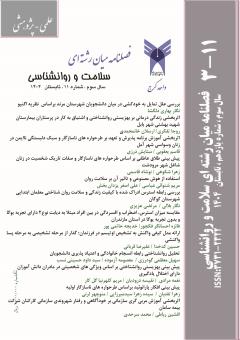ارائه مدل کیفی واکنش به تشخیص اوتیسم در فرزندان؛ گذار از مرحله تشخیصی به مرحله پسا واکنشی - حسین کدخدا / علیرضا قربانی
محورهای موضوعی : روانشناسی سلامت خانواده
حسین کدخدا
1
,
علیرضا قربانی
2
*
![]()
1 - هیت علمی دانشگاه فرهنگیان مشهد
2 - دانشگاه فرهنگیان، مشهد، ایران
کلید واژه: مدل کیفی, اوتیسم, نظریه داده بنیاد, واکنش به تشخیص ,
چکیده مقاله :
مطالعه کنونی با هدف ارائه یک مدل کیفی واکنش به تشخیص اوتیسم در فرزندان بر روی شش نفر از والدین دارای فرزند اوتیسم در محل مدرسه فرزندشان انجام گرفت. این پژوهش با رویکرد کیفی و با روش نظریه برخاسته از دادهها انجام شد. برای گردآوری دادهها در این پژوهش از مصاحبههای نیمه ساختاریافته استفاده شد و مصاحبهها تا اشباع نظری ادامه یافتند. با توجه به جامعه پژوهشی مورد مطالعه نمونهها با استفاده از نمونهگیری شبکهای انتخاب شدند. کدگذاری مصاحبهها در نهایت منجر به شش کد انتخابی شد که شامل تشخیص اوتیسم در کودک، انکار وجود اختلال در کودک، هیجانات منفی و درگیری های ذهنی، محدودیت های فردی و اجتماعی والد، پشتیبانی و حمایت از والد، پذیرش و کنار آمدن با اوتیسم بودند. در نهایت با توجه به کدهای انتخابی و مطابق با آنها یک مدل کیفی و کلگرای سه مرحلهای ارائه گردید که شامل مراحل تشخیصی، واکنشی و پسا واکنشی بود و روند واکنش به تشخیص اوتیسم را آشکار کرد.
The present study aimed to develop a qualitative model of parental responses to their child’s autism diagnosis. Conducted with six parents of autistic children at their child’s school, this qualitative research adopted a grounded theory approach. Data were collected through semi-structured interviews, continued until theoretical saturation was reached. Participants were selected through snowball sampling due to the specific nature of the research population. Interview coding ultimately identified six core themes: (1) receiving the autism diagnosis, (2) denial of the disorder, (3) negative emotions and psychological turmoil, (4) parental social and personal constraints, (5) external support systems, and (6) acceptance and adaptation to autism. Based on these themes, a holistic three-phase model was proposed, comprising the diagnostic, reactive, and post-reactive stages, elucidating the trajectory of parental reactions to the diagnosis.
منابع
1. Anderberg, E., & South, M. (2021). Predicting parent reactions at diagnostic disclosure sessions for autism. Journal of Autism and Developmental Disorders, 51(3), 1–14. https://doi.org/10.1007/s10803-020-04817-5
2. Naicker, V. V., Bury, S. M., & Hedley, D. (2023). Factors associated with parental resolution of a child’s autism diagnosis: A systematic review. Frontiers in Psychiatry, 13, 1079371. https://doi.org/10.3389/fpsyt.2022.1079371
3. American Psychiatric Association. (2018, August). What is an autism spectrum disorder? https://www.psychiatry.org/patients-families/ autism/what-is-autism-spectrum-disorder
4. Ali, A., Rashid, M., Davila-Cervantes, A., Dennett, L., Thompson-Hodgetts, S., & Goez, H. (2023). Parents’ immediate reaction and responses to their child’s ASD diagnosis: A synthesis review. Journal on Developmental Disabilities, 28(1), 1-27.
5. Makino, A., Hartman, L., King, G., Wong, P. Y., & Penner, M. (2021). Parental Experiences of Autism Spectrum Disorder Diagnosis: A Scoping Review. Review Journal of Autism and Developmental Disorders, 8, 267–284. https://doi.org/10.1007/s40489-021-00237-y
6. Legg, H., Tickle, A., Gillott, A., & Wilde, S. (2023). Exploring the Experiences of Parents Whose Child Has Received a Diagnosis of Autistic Spectrum Disorder in Adulthood. Journal of Autism and Developmental Disorders, 53(1), 205–215. https://doi.org/10.1007/s10803-021-05296-y
7. Barak-Levy, Y., & Paryente, B. (2023). Diving into the Resolution Process: Parent’s Reactions to Child’s Diagnosis. International Journal of Environmental Research and Public Health, 20(4), 3295. https://doi.org/10.3390/ijerph20043295
8. Downes, N., Lichtlé, J., Lamore, K., Orêve, M.-J., & Cappe, E. (2020). Couples’ experiences of parenting a child after an autism diagnosis: A qualitative study. Journal of Autism and Developmental Disorders, 51(8), 2697–2710. https://doi.org/10.1007/s10803-020-04744-5
9. Anderberg, E., & South, M. (2021). Predicting parent reactions at diagnostic disclosure sessions for autism. Journal of Autism and Developmental Disorders, 51(1), 123-134. https://doi.org/10.1007/s10803-020-04817-5
10. Naicker, V. V., Bury, S. M., & Hedley, D. (2023). Factors associated with parental resolution of a child’s autism diagnosis: A systematic review. Frontiers in Psychiatry, 13, 1079371. https://Doi.org/10.3389/fpsyt.2022.1079371
11. Malhi, P., Shetty, A. R., Bharti, B., & Saini, L. (2022). Parenting a child with autism spectrum disorder: A qualitative study. Indian Journal of Public Health, 66(2), 121-127. https://doi.org/10.4103/ijph.ijph_1779_21
12. Shattnawi, K. K., Bani, Saeed, W. M., Al-Natour, A., Al-Hammouri, M. M., Al-Azzam, M., & Joseph, R. A. (2020). Parenting a child with autism spectrum disorder: Perspective of Jordanian mothers. Journal of Transcultural Nursing, 31(6), 598-606. https://doi.org/10.1177/1043659620914339
13. Strauss, A. & Corbin, J. (2015). Basics of qualitative research; techniques and stages of production of grounded theory (E. Afshar Trans). Tehran: Ney Publication.
14. Sharbatiyan, M. H., & Ghorbani, A. (2023). The selection process of Farhangian University, the lived experience of a student teacher: a narrative research. SSYJ, 14(49), 25-46.
15. Yaghoobnezhad, S., & Ghorbani, A. (2024). Ground theory about the psychological reactions of fathers to the diagnosis of autism in their children. Journal of Family Relations Studies, 4(15), 51-59. https://doi.org/10.22098/jfrs.2024.15255.1192

